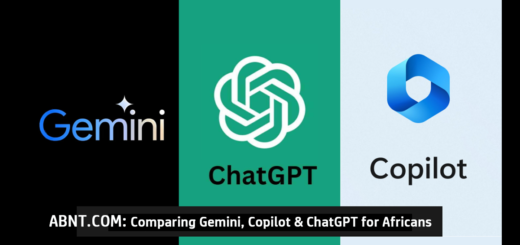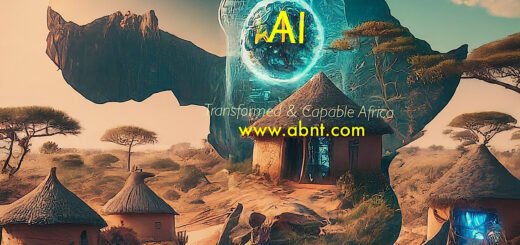Agenda 2063 in the age of AI
Harnessing AI to Realize the Promise of Agenda 2063
Abstract
Agenda 2063 stands as Africa’s most ambitious blueprint for self-reliance, unity, and prosperity by 2063. Yet, conceived before artificial intelligence (AI) emerged as a general-purpose technology, it now faces misalignment amid a data-driven, algorithmically governed world. Without deliberate integration of AI as a cross-cutting enabler and a strategic recentring of digital sovereignty, Africa risks missing developmental milestones and heightened digital colonialism. Through critical reassessment of its seven aspirations, this article exposes systemic gaps in infrastructure, human capital, and digital governance, concluding with policy recommendations to revitalize Agenda 2063 for the AI era.
Introduction
Agenda 2063: The Africa We Want stands as one of the boldest developmental declarations of Africa ever conceived. Adopted by the African Union (AU) in 2013, it articulates a collective aspiration for Africa to emerge as a united, prosperous, and globally influential region by 2063. The framework is structured around seven interdependent aspirations covering economic transformation, political integration, good governance, peace and security, cultural renaissance, human-centered development, and global partnership (African Union, 2015). Together, they form a holistic roadmap for Africa’s renaissance.

Figure 1: The 7 Aspirations of Agenda 2063
These aspirations were formed amid cautious optimism about emerging digital technologies focused on connectivity and financial inclusion, such as mobile telephony and mobile money platforms like M-Pesa. Back in 2013, the role of artificial intelligence as a transformative developmental force was largely speculative. Concepts like cognitive automation, algorithmic decision-making, and data sovereignty were far-sighted ideas rather than immediate realities.
Fast forward to 2025, and AI has become a central nervous system of the global economy, reshaping how value is created, how capital flows, and how supply chains and logistics operate. It has even transformed consumer behavior and, ultimately, the power of states.
Africa now faces profound implications from this AI revolution. The original assumptions of Agenda 2063 are challenged, demanding a strategic recalibration to ensure the continent’s development is aligned with this new era.
The Evolution of AI and Its Global Implications
AI is the capacity of machines to perform tasks requiring human intelligence, including learning, reasoning, perception, problem solving, and language understanding. Although its theoretical foundations date back to the mid-20th century, AI has become a practical and transformative force in the last decade thanks to advancements in machine learning and exponential growth in data and computing power (Russell & Norvig, 2021).
PwC (2017) estimates that AI could add up to 15.7 trillion US dollars to the global economy by 2030. However, more than 70 percent of this economic value is projected to be captured by North America and China, the dominant hubs of AI research and investment (Stanford Institute for Human-Centered Artificial Intelligence, 2024). This entrenched concentration of AI capabilities not only consolidates economic power but intensifies geopolitical asymmetries, marginalizing regions like Africa whose digital infrastructure and AI ecosystems remain underdeveloped.
For Africa, the continent with the world’s youngest population, the stakes are existential. Africa contributes less than one percent of global AI research output and hosts only a fraction of the world’s AI startups (Mohamed et al., 2020). Much of Africa’s digital data is collected, stored, and analyzed by foreign corporations, often without adequate consent or benefit-sharing. This creates a new form of digital dependency, frequently referred to as digital colonialism.
Moreover, AI is reshaping labor markets by automating tasks once thought immune to automation. With Africa’s youth population projected to reach 1.1 billion by 2050 (United Nations, 2022), failure to develop AI capacities and data assets risks mass unemployment, economic setbacks, and social and political instability. Conversely, the strategic harnessing of AI could accelerate development breakthroughs in sectors such as healthcare, education, agriculture, and governance, propelling the attainment of Agenda 2063’s grand visions.
Agenda 2063: A Vision Formulated Before the AI Revolution
Conceived in 2013, Agenda 2063 was shaped by the developmental paradigms prevalent at the time. Its vision centers on building physical infrastructure like roads, railways, and ports to connect economies and facilitate free movement of people, goods, and capital. The African Continental Free Trade Area embodies this vision as the continent’s most ambitious effort to establish a unified market.
However, the world has since been fundamentally reshaped by AI, which disrupts traditional linear development models. AI allows for non-linear growth by enabling digital value to be created and scaled with unprecedented speed and efficiency. For example, while the success of AfCFTA depends on the physical movement of goods, AI-driven logistics platforms and supply chain optimizations can greatly accelerate this process, reducing trade barriers and costs in ways physical infrastructure alone cannot achieve. Likewise, AI-powered e-commerce and fintech platforms are creating new layers of digital trade and financial inclusion, complementing and in some cases superseding traditional capital flows.
The African Union has acknowledged this shift through its Digital Transformation Strategy for Africa, 2020–2030, which focuses on foundational priorities like broadband expansion and digital literacy (African Union, 2020). Nonetheless, while this strategy has yet to fully integrate AI, the AU has since adopted the Data Policy Framework (2022) and the Continental AI Strategy (2024), which begin to articulate AI governance and responsible adoption. These instruments still need to be mainstreamed into Agenda 2063’s implementation.
Consequently, the original Agenda 2063 framework lacks a robust strategy to address critical challenges related to data sovereignty and algorithmic autonomy. Absent a strategic recalibration, Africa risks building a large interconnected market only to find that control over its most valuable digital assets resides elsewhere. This scenario threatens to undermine the self-reliance and prosperity foundational to Agenda 2063.
Examining the Seven Aspirations of Agenda 2063 in the age of AI
The seven aspirations outlined in Agenda 2063 remain powerful articulations of Africa’s developmental ambitions. However, the operational feasibility of these aspirations must now be interrogated in light of the transformative reality of AI. In the AI era, data drives power, algorithms shape governance, and digital sovereignty determines national and continental futures.
The table below assesses each aspiration’s relevance to AI, identifies opportunities, critical gaps, and associated risks, and highlights strategic entry points for recalibration. The aim is to map how Africa’s long-term vision must evolve to remain relevant and achievable within a world shaped by AI and digital transformation.
| Aspiration | AI Relevance | Critical Gaps | Risks | Policy Recalibration |
| 1. A Prosperous Africa Based on Inclusive Growth and Sustainable Development | AI offers productivity gains in agriculture, energy, and manufacturing via automation, predictive analytics, smart systems, and optimized supply chains. | Limited AI-ready industries; poor rural and informal sector digital access; critical workforce skills gaps. | AI adoption inequalities may exacerbate urban-rural and socioeconomic divides; automation without reskilling risks mass unemployment; foreign AI dominance threatens economic autonomy. | Mainstream AI into industrial and economic policies; establish innovation hubs targeting inclusivity; advance workforce digital upskilling; prioritize rural digital infrastructure. |
| 2. An Integrated Continent, Politically United and Based on Pan-African Ideals | AI enables automated customs, multilingual translation, interoperable digital IDs, and real-time trade monitoring—facilitating integration. | Continental AI governance framework is nascent; harmonization and enforcement remain weak; fragmented and inconsistent data policies; absence of unified continental digital ID infrastructure. | Bureaucratic inertia and digital exclusion slow integration progress; overreliance on foreign platforms compromises sovereignty. | Expedite African Data Policy Framework harmonization; deploy Pan-African Digital Identity System; institute continent-wide AI data and system interoperability standards. |
| 3. An Africa of Good Governance, Democracy, Respect for Human Rights, Justice, and the Rule of Law | AI supports enhanced service delivery, fraud detection, and predictive policy analytics. | Lack of frameworks mandating algorithmic transparency; insufficient AI governance oversight; unchecked surveillance capabilities. | Risk of AI-driven authoritarianism; privacy erosion; erosion of public trust through opaque AI decisions. | Adopt a Continental Charter on Ethical AI; mandate algorithmic impact assessments; establish independent AI oversight bodies. |
| 4. A Peaceful and Secure Africa | AI strengthens conflict early warning, drone surveillance, and cybersecurity defense. | Absence of a unified AI security doctrine; weak defense AI capabilities; high vulnerability to AI-propagated disinformation and cyberattacks. | Weaponization of AI technologies; electoral destabilization; asymmetric cyber-threats. | Develop a Continental AI Security Doctrine; ban lethal autonomous weapon systems; integrate ethical AI in peacekeeping. |
| 5. An Africa with a Strong Cultural Identity, Common Heritage, Values, and Ethics | AI can preserve and promote indigenous African languages, cultures, and philosophies through culturally sensitive AI models. | Dominance of Western AI models excludes African languages and perspectives; lack of African epistemic datasets. | Cultural and linguistic erosion; marginalization from AI knowledge creation and benefits. | Launch “Project Ubuntu AI” focused on African NLP; fund culturally relevant AI research; require cultural impact assessments for AI. |
| 6. An Africa Whose Development is People-Driven, Relying on African People Especially Women and Youth | AI literacy is emerging as foundational for socioeconomic participation and empowerment. | Outdated education curricula; gender disparities in STEM; low AI awareness in marginalized groups; weak talent development ecosystems. | Deepening digital divides exclude vulnerable populations; AI-driven automation risks job displacement; elite capture narrows benefits. | Revise education curricula to include AI fundamentals and ethics; scale AI4Girls and mentorship programs; build inclusive national AI talent pipelines. |
| 7. Africa as an Influential Global Player and Partner | AI represents a geopolitical lever; control of AI models and data shapes global influence and norm-setting. | Absence of African-led AI foundational models; limited voice in global AI governance; barriers to equitable technology transfer. | Risk of continued marginalization in AI governance; perpetuation of uneven AI benefit-sharing. | Strengthen African leadership in AI governance; advocate for fair and open AI standards; foster regional and global AI research partnerships and development. |
This analysis underscores that while Agenda 2063’s aspirations remain relevant in vision; their current operational frameworks are insufficiently prepared for the challenges and opportunities presented by AI. Common deficits include underdeveloped digital infrastructure, fragmented data, and insufficient human capital.
Therefore, the future of Africa’s development hinges on recognizing AI as a strategic enabler embedded holistically across all aspirations through continent-wide policies, targeted capacity building, infrastructural investments, and collaborative governance mechanisms. This approach will enable Africa to harness AI’s potential, close existing digital divides, and assert digital sovereignty to realize a prosperous, integrated, and resilient continent aligned with the enduring promise of Agenda 2063.
Recommendations
To revitalize Agenda 2063 in the AI era, Africa needs a systemic, continent-wide approach that treats AI as a cross-cutting enabler across all seven aspirations. The following strategic policy interventions are essential:
1. Institutionalize Continental AI Governance
- Establish a Pan-African Artificial Intelligence Agency (PAAI) within the African Union framework with mandates to coordinate AI policy harmonization, ethical standards, certification of AI systems, funding for research and innovation, and representation in global AI governance forums.
- Strengthen coordination among key regional and continental institutions to ensure coherence with existing development frameworks.
2. Embed AI Deeply into Agenda 2063’s Implementation Framework
- Revise the Agenda 2063 monitoring and evaluation system to include explicit AI-related indicators and targets, for example:
- Establish regional AI research hubs by 2030, with equitable access for all AU member states.
- Achieve significant AI literacy among African youth (for example, 50% by 2035), building on existing digital literacy programs and teacher-training capacity.
- Localize 80% of critical government and public data within African-owned, sustainable data centers by 2040.
- Use AI-enhanced tools for real-time progress tracking and impact assessments.
3. Prioritize Investment in Foundational Digital Infrastructure
- Fast-track high-speed broadband expansion, especially targeting rural and marginalized communities, to close digital divides.
- Invest in sovereign, energy-efficient data centers and cloud infrastructures empowering African control over digital ecosystems and data assets.
4. Transform Education and Human Capital Development
- Introduce comprehensive AI literacy, computational thinking, data science, and AI ethics into education curricula at all levels.
- Launch teacher-training programs focused on AI pedagogy.
- Expand initiatives like AI4Girls to close gender gaps in STEM.
- Promote vocational and lifelong learning programs aimed at reskilling workers potentially displaced by AI-driven automation.
5. Foster African-Led AI Innovation Ecosystems
- Create a Continental AI Research Fund prioritizing applied research in agriculture, health, climate resilience, and African languages.
- Support startups and innovation hubs with public-private partnerships and conducive regulatory environments.
- Encourage multinational and pan-African research collaborations.
6. Develop and Enforce a Robust Ethical AI Framework
- Adopt a Continental Charter on Ethical AI mandating transparency, fairness, human rights protections, and accountability mechanisms including algorithmic impact assessments and ensuring explainability in high-stakes AI decisions affecting citizens.
- Complement the Charter with enforceable sector-specific guidelines (e.g., health, finance, education) and annual public reporting requirements for high-risk AI systems.
- Establish independent AI oversight and regulatory bodies at both continental and national levels to enforce responsible AI development and deployment.
- Prohibit AI-enabled mass surveillance and lethal autonomous weapons systems.
7. Assert Africa’s Influence in Global AI Governance
- Engage proactively in multilateral AI platforms such as GPAI and UN advisory groups to amplify African perspectives.
- Develop partnerships focused on equitable technology transfer, joint innovation, capacity-building and respect for Africa’s data sovereignty and ethical governance principles rather than passive market participation.
- Lead regional efforts to increase Africa’s contribution and voice in global AI knowledge production and standard-setting.
These recommendations represent a systemic and coordinated continental strategy to ensure AI is fully embedded as an accelerator of Agenda 2063’s ambitions.
Conclusion
Agenda 2063 captures Africa’s vision for unity, prosperity, and self-reliance by 2063. However, it was developed before AI emerged as a transformative force reshaping global economies, politics, and societies.
The article has explored how AI fundamentally alters the development landscape. In a world where control over data and algorithms defines power, Africa’s original aspirations face significant operational challenges that must be urgently addressed.
Significant gaps in infrastructure, human capital, and governance limit the continent’s ability to leverage AI effectively. Without deliberate integration of AI as an enabling force and a renewed commitment to Africa’s digital sovereignty, the risk of marginalization in the global digital economy grows.
At the same time, AI presents an unprecedented opportunity to accelerate growth, deepen integration, and enhance Africa’s global influence. Realizing this potential requires bold continental leadership, unified action, and strategic investments in digital infrastructure, human capital, and governance capacity. With deliberate integration of AI into every aspiration of Agenda 2063, Africa can advance a resilient and inclusive future that reflects its long-term vision for unity, prosperity, and self-reliance.
References
- African Union. (2015). Agenda 2063: The Africa we want. https://au.int/en/agenda2063/overview
- African Union. (2020). Digital transformation strategy for Africa (2020–2030). https://au.int/en/documents/20201207/digital-transformation-strategy-africa-2020-2030
- African Union. (2022). African Union Data Policy Framework. https://au.int/en/documents/20220728/au-data-policy-framework
- African Union. (2024). Continental Artificial Intelligence Strategy for Africa. https://au.int/en/documents/20240809/continental-artificial-intelligence-strategy
- Mohamed, S., Png, M.-T., & Isaac, W. (2020). Decolonial AI: Decolonial theory as sociotechnical foresight in artificial intelligence. Philosophy & Technology, 33(4), 659–684. https://doi.org/10.1007/s13347-020-00405-8
- PwC. (2017). Sizing the prize: What’s the real value of AI for your business and how can you capitalise?. https://www.pwc.com/gx/en/issues/analytics/assets/pwc-ai-analysis-sizing-the-prize-report.pdf
- Russell, S., & Norvig, P. (2021). Artificial intelligence: A modern approach (4th ed.). Pearson.
- Stanford Institute for Human-Centered Artificial Intelligence. (2024). AI index report 2024. https://aiindex.stanford.edu/
- United Nations. (2022). World population prospects 2022. https://population.un.org/wpp/
Related posts: Redefining Capacity Building for Africa in the AI Era| A Strategic Foresight Framework for Digital Transformation in VUCA World | Top Trends Shaping Africa’s Digital Economy in 2025| Innovation Ecosystems: Key to Africa’s Digital Transformation




[…] post: Leapfrogging the Future: How AI can Transform Africa | AI Capacity Building in Africa | Unlocking Africa’s Potential…
[…] ABNT. (2024). The Impact of Artificial Intelligence on African Economies. Retrieved from https://abnt.com/?p=37 […]
[…] Related posts: Bridging the digital divide for inclusive & sustainable developmentReflection on the Digital Transformation Strategy for Africa (2020-2030)…
[…] posts: Bridging the digital divide for inclusive & sustainable developmentReflection on the Digital Transformation Strategy for Africa […]
[…] Related posts: Reflection on the Digital Transformation Strategy for Africa (2020-2030) […]